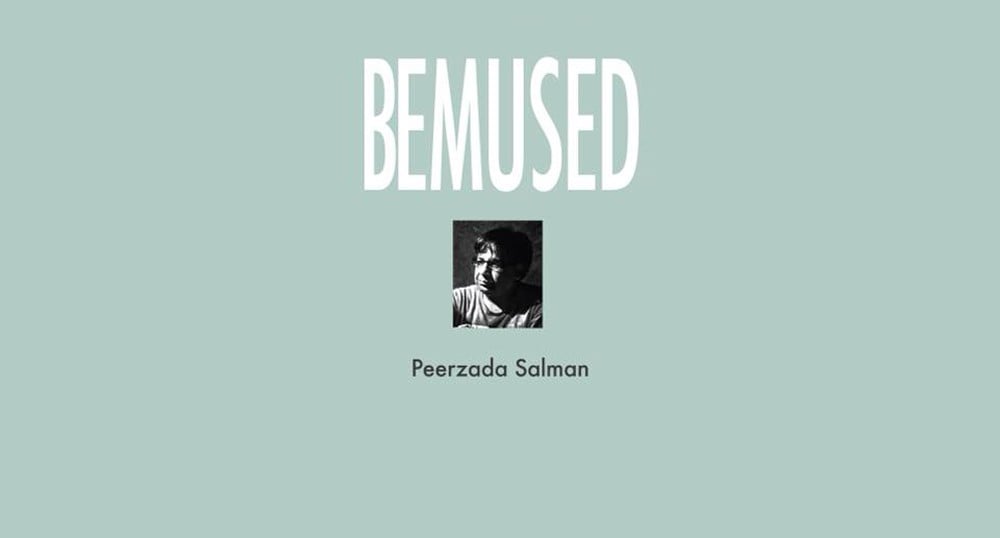
The concerns of Peerzada Salman’s poems accrue from his many years of journalistic witness and a garnered voice of light-hearted critique

To a reader in Pakistan, the poems in Peerzada Salman’s recently published collection Bemused ring familiar as they draw from a vast canvas of the local socio-political experience. In the collection spanning a series of over 60 poems, one finds issues and concerns that include, but are not limited to, nuclear war, terrorism, journalistic freedom, colonial history, social media, nature, popular culture, cultural and political figures of import and influence, such as, the late Sabeen Mahmud, Naiyar Masud, or Donald Trump.
The value of familiarity lies in reference to either event, figure, or image, but mostly in the implications of meaning or the formation of truth the lines attempt to draw as a whole. For instance, in the poem, ‘Freedom of the press’, Salman writes of the rampant lack of freedom among the presses within the country. "Truth has no blurb", he says and warns one of the dangers of voicing it:
Take good care
of the jagged headline
It can cut your nose
And spite your face
In ‘Suicide attack in Quetta’, Salman poignantly points out our own familiar fickleness of grief and complicity in inaction in the face of public tragedy:
Mourn one last time
For tomorrow you will be faceless
Like those who scoffed at Abel
Or stood by Cain
Like those who invented pain
In ‘Nuclear War -- I’, amidst a climate of defeat and ravage, he finds consolation and sustenance in the presence of literature:
In the far corner of the building cut to size
Under the rubble of fruity dreams
A book, sheltering countless fez-wearing ghazals, still
Breathes
A Karachi-based journalist, short story writer and poet, the concerns of Salman’s poems accrue from his many years of journalistic witness and a garnered voice of light-hearted critique. Salman has worked for the newspaper Dawn alone for 14 years. In the wry treatment of his subjects, the reader can decipher an ironic vein of amusement that one learns over time, and once he has distilled a sense of truth from knowledge and acquired the privileged ability to scrutinise it from a distance.
The voice that is sustained throughout his poems is far from bemused in the bewildering sense of the word and, though not always wry, it remains ambitious in its sought gravity regardless of his choice of subject; whether he is writing of an orphaned girl from Fallujah, the way a black bra slopes down a shoulder, or of the pervading ennui within a climate of war.
Despite its strengths, however, choices of craft in the writing of these poems, entreat for further forethought and deliberation.
Salman’s predilection for end rhymes in his poems, for instance, often compromises the possible force and depth of its message. In some rare cases, the rhymes successfully broaden meaning and lead us to that desired elsewhere of the consciousness, such as in the epiphanic last lines of ‘Suicide attack in Quetta’ quoted earlier. However, more often than not, the line or rhyme forsakes possibilities for further discovery within the poem leading to a contrived effect that deprives his words of further resonance.
In several poems, a sense of meaning often lays scattered and yearning to be fulfilled. Salman’s ruminations lead the reader to question what the poem intends to say or where the intended trigger of the poem lies. His poems of observation, such as, ‘The black bra’, ‘A game of chess’, ‘Cosmopolitanism -- I’, and ‘Cosmopolitanism -- II’ deliver a promising sense of premise through his sustained focus.
However, often, the truth is either lost, compromised, or remains uncovered in the face of a lack of premeditation and careful attention to craft evident in surface descriptions, mismatched images, poor choice of titles, recurring lack of clarity of thought, clichéd phrases, and the heedless use of slang.
Take, for instance, the poem "Cosmopolitan – II" in which Salman describes a scene at a breakfast buffet. After deliberating on the waffles that "are a bit racist for his liking," one wonders if Salman escapes the glaring stereotypes embedded in his own observations as he surveys "the unmissable South Indian boy/Dark like truth to be told" and "The early bird blonde/Oozing sex and money". Compassing the voice of humanity in the poem, if there is one, is rendered more befuddling in the final epiphany where Salman concludes: "all lives matter".
The light-hearted humour in the final jibe of the poem reaches one. What Salman tries to transmit through the use of political slogan in a poem where the speaker feels maligned by waffles is simply funny, common, and thus familiar to witty behaviour. Though his usage is simplistic. A reading of it craves for that particular underside of a witty imagination that probes the consciousness for a more difficult truth of the human condition.
For what else could it possibly mean to use a slogan that urges the protection and representation of maligned communities in a poem where the quotidian functions in as apparent and disinterested oblivion to its import as the speaker appears to be to its socio-political roots? For Salman does not indicate if the poem is situated in America, where the slogan originally emerged from a complex debate over the aptness of "black lives matter", the slogan of Black Lives Matter movement. Neither does the poem attempt to ruminate on its connection to the words.
If the slogan’s usage is for mere comedy, then its effect is one of trivialisation and not of the import that stems from informed satire, but from the overlooked lacuna in humanity that distinguishes mere observation in writing from the real work of literature.